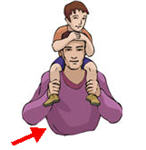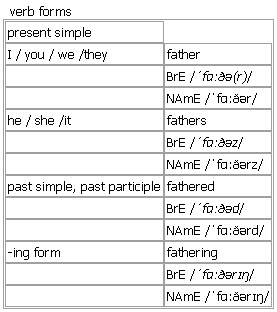|
Từ điển Oxford Advanced Learner 8th
 father
father

father [father fathers fathered fathering] noun, verb BrE [ˈfɑːðə(r)] NAmE [ˈfɑːðər]
noun
1. a male parent of a child or an animal; a person who is acting as the father to a child
• Ben's a wonderful father.
• You've been like a father to me.
•Our new boss is a father of three (= he has three children).
•He was a wonderful father to both his natural and adopted children.
• (old-fashioned)Father, I cannot lie to you.
see also ↑godfather, ↑grandfather, ↑stepfather
2. fathersplural (literary)a person's ↑ancestors (= people who are related to you who lived in the past)
•the land of our fathers
see also ↑forefathers
3. ~ (of sth) the first man to introduce a new way of thinking about sth or of doing sth
•Henry Moore is considered to be the father of modern British sculpture.
see also ↑founding father
4. Fatherused by Christians to refer to God
•Father, forgive us.
•God the Father
5. Father (abbr.Fr)the title of a priest, especially in the Roman Catholic Church and the Orthodox Church
•Father Dominic
see also ↑Holy Father
more at old enough to be sb's father/mother at ↑old, the wish is father to the thought at ↑wish n.
Word Origin:
Old English fæder, of Germanic origin; related to Dutch vader and German Vater, from an Indo-European root shared by Latin pater and Greek patēr.
Thesaurus:
father noun C
•Gary's a wonderful father.
parent • • stepfather • • guardian • |informal, especially spoken dad • • daddy • |especially AmE, informal folks •
a good/bad/caring/loving father/parent/dad
take after/inherit sth from your father/parents/dad/daddy
become a/sb's father/parent/stepfather/guardian/dad
Father or dad? In spoken English dad is much more frequent. It can sound formal to say my father.
Example Bank:
•Boland, a father of two, was arrested on charges of theft.
•Elena's brother was a surrogate father to her kids after her husband died.
•He followed in his father's footsteps and became a motor mechanic.
•He followed the footsteps of his famous father into the film industry.
•He had a domineering mother and a cold, distant father.
•He has an ailing father and two younger brothers to support.
•He has just become the proud father of a baby girl.
•He is very good with children and would make a devoted father.
•He paced like an expectant father.
•He succeeded his father as Professor of Botany.
•He was a wonderful father to her.
•He was both a bad husband and a bad father.
•I always thought of you as a second father.
•I buried my father, and mourned his death.
•I lost my father when I was nine.
•Jesse is now married and father to a young son.
•Meet your new father.
•Ryan has gone looking for his long-lost father.
•She followed her father into the legal profession.
•She inherited the urge to travel from her father.
•She kept the books that had belonged to her beloved father.
•Some of his students regard him as a father figure.
•The land passes on from father to son.
•The new father took his son into his arms.
•The two boys were like their mother in character, but Louise took after her father.
•Their musician father encouraged their love of music.
•Try your best to honor your father.
•a married father of two
•the grieving father of two children lost at sea
•Ben's a wonderful father.
•Our new boss is a father of three.
•You've been like a father to me.
Idioms: ↑from father to son ▪ ↑like father, like son
verb
1. ~ sb to become the father of a child by making a woman pregnant
•He claims to have fathered over 20 children.
2. ~ sth to create new ideas or a new way of doing sth
Verb forms: 
Word Origin:
Old English fæder, of Germanic origin; related to Dutch vader and German Vater, from an Indo-European root shared by Latin pater and Greek patēr.
|
|
|
▼ Từ liên quan / Related words
Related search result for "father"
|
|
